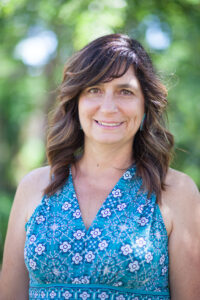 Suzanne Nash is the First Medicines Program Manager at the Indigenous Peoples Task Force (ITPF), located in Minneapolis, Minnesota. ITPF, which uses indigenous values and practices to improve wellness in local communities, is an endorsing partner for Breast Cancer Action’s Say Never to Forever Chemicals campaign, and has joined us in calling on corporate giant 3M to stop developing, using, and selling toxic PFAS, which have been linked to serious health harms and may cause breast cancer. We spoke with Suzanne recently to ask her about living near 3M, PFAS contamination, and why her organization doesn’t use 3M products.
Suzanne Nash is the First Medicines Program Manager at the Indigenous Peoples Task Force (ITPF), located in Minneapolis, Minnesota. ITPF, which uses indigenous values and practices to improve wellness in local communities, is an endorsing partner for Breast Cancer Action’s Say Never to Forever Chemicals campaign, and has joined us in calling on corporate giant 3M to stop developing, using, and selling toxic PFAS, which have been linked to serious health harms and may cause breast cancer. We spoke with Suzanne recently to ask her about living near 3M, PFAS contamination, and why her organization doesn’t use 3M products.
You lived in Oakdale, Minnesota, a town where 3M dumped PFAS waste, and where childhood cancer rates are far higher than normal. What impact has that had on you?
I lived in Oakdale for 13 years and many people on my block had some form of cancer. My mother in-law lived in Oakdale for over 40 years and was diagnosed with breast cancer at the age of 60. There were several other people on her block who had some form of cancer as well.
The Minnesota Attorney General brought a suit against 3M for PFAS contamination in the areas of Oakdale, Lake Elmo, and Cottage Grove. 3M had secretly dumped barrels of chemicals used in their products and buried them underground. The water system was contaminated with cancer-causing PFAS as a result. Attorney General Swanson cited increased cancer rates, and other health issues, in area residents and blamed 3M, Just before the trial began, 3M settled for $850 million without admitting wrong doing.
Please tell our readers about your office policy regarding the use of 3M products.
At my organization, the Indigenous Peoples Task force, we have a policy to not purchase any 3M products. Due to health consequences of 3M products it was easy. We do not need most of the products. If you need to write a note, a text suffices. It was as easy as our policy prohibiting styrofoam cups and plates because they are environmentally unsustainable.
We know that breast cancer rates are high among minority women. Can you give us a sense of the risk for Native American women?
The statistics are alarming. I got the following information from the American Indian Cancer Foundation: 
Why is IPTF endorsing the Say Never to Forever campaign and calling on 3M to stop producing, using, and selling all PFAS?
We support the Say Never to Forever Chemicals campaign because we want to join Breast Cancer Action in sending a message to 3M. Their PFAS have already caused too much damage and affected too many lives. It’s past time for 3M to take responsibility.
Suzanne Nash (Ojibwe) has worked at the Indigenous Peoples Task Force for 17 years in many capacities. She has been the Housing Director, Medical Case Management Supervisor, Program Manager for the Waybingay Curriculum, and has participated in the Teaching Garden Curriculum. Suzanne has facilitated and coordinated tobacco cessation education and policy work with 11 tribes in Minnesota and in urban areas. For the past 15 years, she has organized and facilitated statewide conferences around tobacco, cultural teachings, traditional foods, environmental issues, and policy work, and is currently working as a Policy Champion on Tobacco Control. She is an alumnus of the Leadership and Advocacy Institute to Advance Minnesota’s Parity for Priority Populations (LAAMPP)